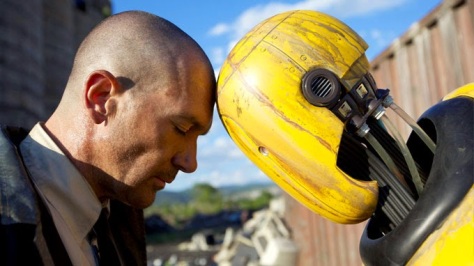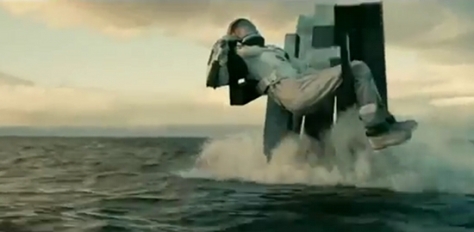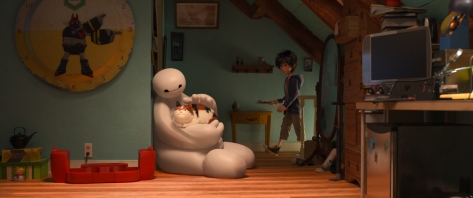by Gabriel Valdez
“I have asked myself that many times as I have struggled to be more human. Until I realized: it is the struggle itself that is most important. We must strive to be more than we are, Lal. It does not matter that we will never reach our ultimate goal. The effort yields its own rewards.”
– Data, “The Offspring,” Star Trek: The Next Generation
HBO just ordered Westworld to series. Based on the 1973 film of the same name, it will focus on an Old West theme park in which all the actors are robots with the artificial intelligence required to play their parts. At a point, they malfunction and rebel. Along with JJ Abrams, Jonathan Nolan (brother to director Christopher and co-writer on Interstellar) is serving in a production role, but it’s not the only series he has with HBO.
His Foundation series, based on Isaac Asimov’s series of novels, will soon join it. This is exciting news: HBO has signed Darren Aronofsky (Noah) to develop Margaret Atwood’s bleak pre- and post-apocalypse MaddAddam trilogy, director David Fincher and writer Gillian Flynn (Gone Girl) to adapt BBC’s Utopia, and rumors have swirled around Peter Dinklage leading the sci-fi/supernatural thriller about a dwarf private eye, Beasts of Valhalla.
That’s no less than 5 science-fiction projects HBO is developing. They’re becoming the SyFy channel we always wanted.
There’s something else happening, however, and not just at HBO. Westworld and Foundation are part of it, but so are upcoming films like Gabe Ibanez’s Automata, Neill Blomkamp’s Chappie, and Alex Garland’s Ex Machina.
Robots are settling in. They’re coming to get us. And I couldn’t be more thankful.
See, robots used to be the bad guys. I’m sure they will be in Westworld (that’s the whole plot), but it’s HBO – we’ll have sympathetic robots trying to do the right thing (Evan Rachel Wood plays an AI discovering that she’s artificial for the first time) and getting screwed over for it, and we’ll have dastardly evil ones (Ed Harris is picking up the Yul Brynner role, for instance) being, well, dastardly and evil. The humans (Anthony Hopkins, Miranda Otto) look to be the real terror.
In Foundation, however? In the novels, robots are generally good, helpful, self-sacrificing for their human brethren.
In Automata, we treat a society of robots like refuse, much the same way we treat third-world countries as we sap their resources. In Chappie, a childlike robot learns to care, to sacrifice…to be human. The humans abuse and fight over it. Ex Machina is a film that asks a man (or is he?) to choose between trusting a robot and a human being.
Look at Big Hero 6 and Interstellar, or last year’s Her. Baymax, TARS, and Samantha are well-meaning artificial intelligences full of personality, there to aid humanity. In Big Hero 6, Baymax is a friend to Hiro, who draws Hiro back from a dark moment in the film’s most heartfelt scene. In Interstellar, TARS is the most beautifully selfless character of the year. In Her, we are given an AI with the capability for love.
Gone are the days where a robot was our nemesis, when our fear of losing jobs to technology made us believe in Hal and Terminators and the android in Alien. Now we have something much worse – drones – and we’ve lost those jobs because of human decisions. We are ourselves a species that lead double-lives, the real and the one on the screen in front of you as you read this. We are psychologically, if not physically, cyborgs. Is that bad? Is that good? We have yet to figure it out very well – the evolution is still happening.
What do robots become if we’re psychologically closer to them now than ever before, as we look around a brilliantly interconnected world and see for the first time the true scope of how inhuman humans can be?
The tide has turned. We think the opposite now – robots in fiction don’t threaten the loss of our humanity. We’re doing a fine job of that ourselves. Instead, they represent searching for something better in ourselves. All these robots strive for something in common, as Data on The Next Generation once yearned for: to become more human. The few that don’t have already reached a human ideal – like Baymax and TARS, that of helping unconditionally. They each treasure being human seemingly more than we do, not to survive but to survive rightly.
They are no longer a projection of fear of the “other,” like the aliens in our science-fiction. They aren’t a paranoia about technology. Now, they harken back to what Isaac Asimov originally imagined: the next logical extension of an idealized human race. The only problem is that the human race isn’t holding up that “idealized” end of the bargain.
It’s not a robot’s strength or their speed that we envy in fiction, not their inability to suffer hunger or sleeplessness. It’s how beautifully they see the world in that moment of self-awareness. That’s the capability we envy most, the fairy tale of seeing with fresh eyes what we’ve come to view with cynicism and doubt.
Science-fiction once used robots as the next step of evolution for a human civilization that had overcome its petty squabbles. They were the reward for our curiosity and cooperation, allowing us to stretch that curiosity even further into the universe. Now, science-fiction views them as a correction, an improvement. They don’t yearn to be like us anymore. We sit in the theater and yearn to follow their selfless example. Or at least, we should.
They now hold a perspective we deeply miss, that which once believed curiosity and cooperation really could win out. They can’t be here to help us extend our curiosity if we’ve given up on curiosity itself. Instead, they’re here to be the last shreds of our human conscience.
So I say let the robots come and get us. Maybe they can teach us something. If we won’t struggle to be human anymore, somebody ought to.



